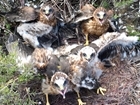Blogs
-

-

-

in:
GWCT News Blog
under:
Events
, GWCT Wales
The beautifully located Dovey Valley Shooting Ground hosted the inaugural Welsh Side by Side Championship organised by Peter Croft, ex-Olympic coach. Held on 8 October, the day was blessed with lovely weather and a turnout from as far afield as the Midlands and South Wales.
-

in:
GWCT News Blog
Don't miss your chance to win an exclusive day for eight Guns on four of the most outstanding shoots in Essex.
-

-

-

in:
Fisheries Blog
under:
Fishing
Back in 1973 the first electronic fish counter was installed on the River Frome in Dorset to monitor salmon. This is the story of 50 years of salmon research told by the GWCT's Fisheries team.
-

in:
GWCT News Blog
under:
Letters
, Hen harrier/Grouse shooting
, GWCT in the media
The small number of individuals committing these crimes undermine the reputation of the thousands of people doing wonderful work in our countryside, without whom we wouldn’t have the biodiversity, habitat, social cohesion and cultural traditions that so many of us cherish.
-

in:
GWCT News Blog
under:
Waders
Wtach this short video of Elli discussing her fascinating curlew research in the New Forest.
-

in:
GWCT News Blog
under:
Advice
, General Licences
Defra has advised GWCT and other stakeholders that new wild bird control General Licences for England (GL40-42) will come in to force on 1st January 2024. Defra has confirmed that it is not currently planning to make any changes and will replicate the existing GL40-42 conditions in the new licences.
Get the Latest News & Advice
Join over 100,000 subscribers and stay updated on our latest advice, research, news and offers.
*You may change your mind any time. For more information, see our Privacy Policy.